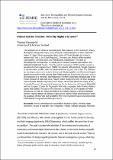Files in this item
Poland and the Silesians : Minority rights à la carte?
Item metadata
| dc.contributor.author | Kamusella, Tomasz Dominik | |
| dc.date.accessioned | 2013-01-07T16:37:06Z | |
| dc.date.available | 2013-01-07T16:37:06Z | |
| dc.date.issued | 2012-12-21 | |
| dc.identifier | 41486850 | |
| dc.identifier | 5030a661-1a21-4e7b-9ad8-60d815af4065 | |
| dc.identifier.citation | Kamusella , T D 2012 , ' Poland and the Silesians : Minority rights à la carte? ' , Journal on Ethnopolitics and Minority Issues in Europe , vol. 11 , no. 2 , pp. 42-74 . | en |
| dc.identifier.issn | 1617-5247 | |
| dc.identifier.other | ORCID: /0000-0003-3484-8352/work/42102761 | |
| dc.identifier.uri | https://hdl.handle.net/10023/3317 | |
| dc.description.abstract | The Silesians are an ethnic or national group that coalesced in the nineteenth century. During the subsequent century, they survived repeated divisions of their historical region of Upper Silesia among the nation-states of Czechoslovakia (or today its western half, that is, the Czech Republic), Germany, and Poland, which entailed Czechization, Germanization, and Polonization, respectively. The ideal of ethnolinguistic homogeneity, a typical goal of Central European nationalism, was achieved in post-war Poland. After the end of communism (1989) and the country‟s accession to the European Union (2004), this ideal is still aspired to, though it appears to stand in direct conflict with the values of democracy and rule of law. The Silesians are the largest minority in today‟s Poland and Silesian speakers are the second largest speech community in this country after Polish-speakers. Despite the Silesians‟ wish to be recognized as a minority, expressed clearly in their grassroots initiatives and in the Polish censuses of 2002 and 2011, Poland neither recognizes them nor their language. This inflexible attitude may amount to a breach of the spirit (if not the letter) of the Council of Europe‟s Framework Convention for the Protection of National Minorities and the European Charter for Regional or Minority Languages, both of which Poland signed and ratified. The case of the Silesians is a litmus test of the quality of Polish democracy. In order to resolve the debacle, the article proposes a genuine dialogue between representatives of Silesian organizations and the Polish administration under the guidance of observers and facilitators from the Council of Europe and appropriate international non-governmental organizations. | |
| dc.format.extent | 337104 | |
| dc.language.iso | eng | |
| dc.relation.ispartof | Journal on Ethnopolitics and Minority Issues in Europe | en |
| dc.subject | Census | en |
| dc.subject | Ethnolinguistic nationalism | en |
| dc.subject | Linguistic rights | en |
| dc.subject | Minority rights protection | en |
| dc.subject | Misuse of statistics | en |
| dc.subject | Silesians | en |
| dc.subject | Silesian language | en |
| dc.subject | Poland | en |
| dc.subject | Non-recognition | en |
| dc.subject | JN Political institutions (Europe) | en |
| dc.subject | PG Slavic, Baltic, Albanian languages and literature | en |
| dc.subject | SDG 16 - Peace, Justice and Strong Institutions | en |
| dc.subject.lcc | JN | en |
| dc.subject.lcc | PG | en |
| dc.title | Poland and the Silesians : Minority rights à la carte? | en |
| dc.type | Journal article | en |
| dc.contributor.institution | University of St Andrews. School of History | en |
| dc.description.status | Peer reviewed | en |
| dc.identifier.url | http://www.ecmi.de/fileadmin/downloads/publications/JEMIE/2012/Vol_2_Dezember_2012/4._JEMIE_Kamusella.pdf | en |
This item appears in the following Collection(s)
Items in the St Andrews Research Repository are protected by copyright, with all rights reserved, unless otherwise indicated.

